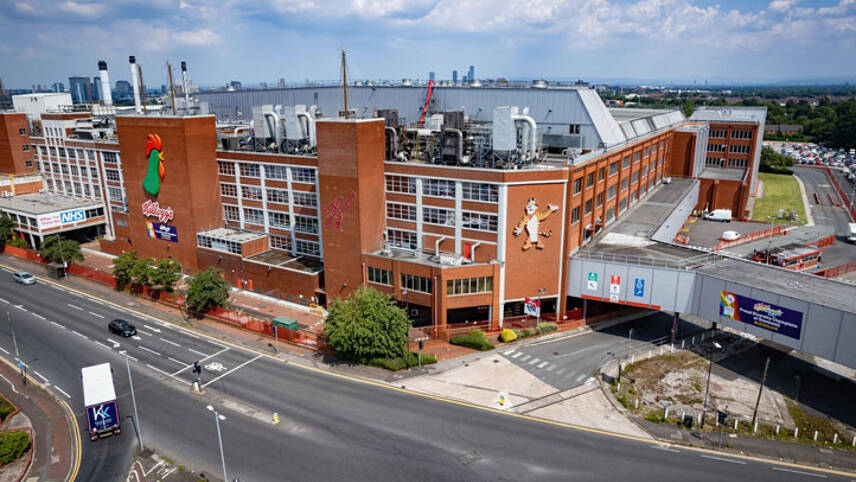Register for free and continue reading
Join our growing army of changemakers and get unlimited access to our premium content

Image: Kellogg Company
In total, £80m has been confirmed for allocation across 29 projects.
Energy Security and Net-Zero Minister Graham Stuart said the investment will help manufacturers to “use the latest science, technologies, and new energy sources to cut ties with fossil fuels and future-proof their industries”.
Cereal giant Kellogg’s is one of the 13 businesses to benefit from the latest round of the Industrial Fuel Switching Competition, which supports large energy users in adopting alternatives to fossil fuels.
The business will use the funding to trial hydrogen in its heating processes. Hydrogen is being provided under the HyNet collaborative project and is being generated by Vertex Hydrogen, which is set to start producing blue hydrogen in Stanlow and green hydrogen elsewhere in the UK.
Other firms involved in HyNet and benefitting from this week’s funding are hygiene and health major Essity, which owns Tena and Bodyform; and aluminium firm Novelis. Hydrogen will start being supplied to the businesses in the mid-2020s.
Each of the 13 business benefitting from this round of the Industrial Fuel Switching Competition is receiving a maximum of £6m in grant funding. Several are matching this with their own investments.
Other funded projects include the switching of gas-fired ovens with electric ones at biscuit manufacturer Burton’s Foods’ site in St Albans and trials of thermal energy storage at the Annadale Distillery near Edinburgh.
Carbon capture innovation
The Government has also confirmed funding for 11 carbon capture, usage and storage (CCUS) innovations, to the tune of £9.2m, plus a further £21.2m for projects using bioenergy for hydrogen production and CCUS.
Under the CCUS Innovation Competition, the government is backing two innovations that could capture CO2 in concrete and other construction projects. It is also supporting next-generation methods for capturing carbon from industrial processes using metal organic frameworks – materials with a highly porous structure that can capture CO2 and then be densified into crystal.
Funding has also been confirmed for methods of storing and using captured carbon, including undersea storage wells and reuse in fertiliser.
The Hydrogen BECCS Innovation Programme, meanwhile, is supporting projects aimed at developing bioenergy feedstocks for hydrogen production. It is also funding the developers of technologies that can gasify the feedstocks.
Paul Willacy, the managing director of one of the successful businesses, Compact Syngas Solutions, said: “Winning a second round of funding is an incredible achievement for the team, as we were up against some stiff competition.”
He is overseeing the development of an advanced gasification process that could generate hydrogen from waste wood and non-recyclable commercial and household waste.
Commenting on the entire funding package, Green Finance Minister Lord Callanan said: “The transition away from fossil fuels presents a huge opportunity for our growing green energy sector and we will continue to make sure UK business can benefits from its full potential.”
Earlier this week, the UK Government’s climate advisors published their latest annual report on progress towards the 2050 net-zero target. The Climate Change Committee warned that “credible plans” exist to deliver just one-quarter of the necessary future emissions reductions.
Plans from the Government are either “insufficient” or have “significant risks” for 70% of the emissions reductions required in industry, the Committee warned.


Please login or Register to leave a comment.